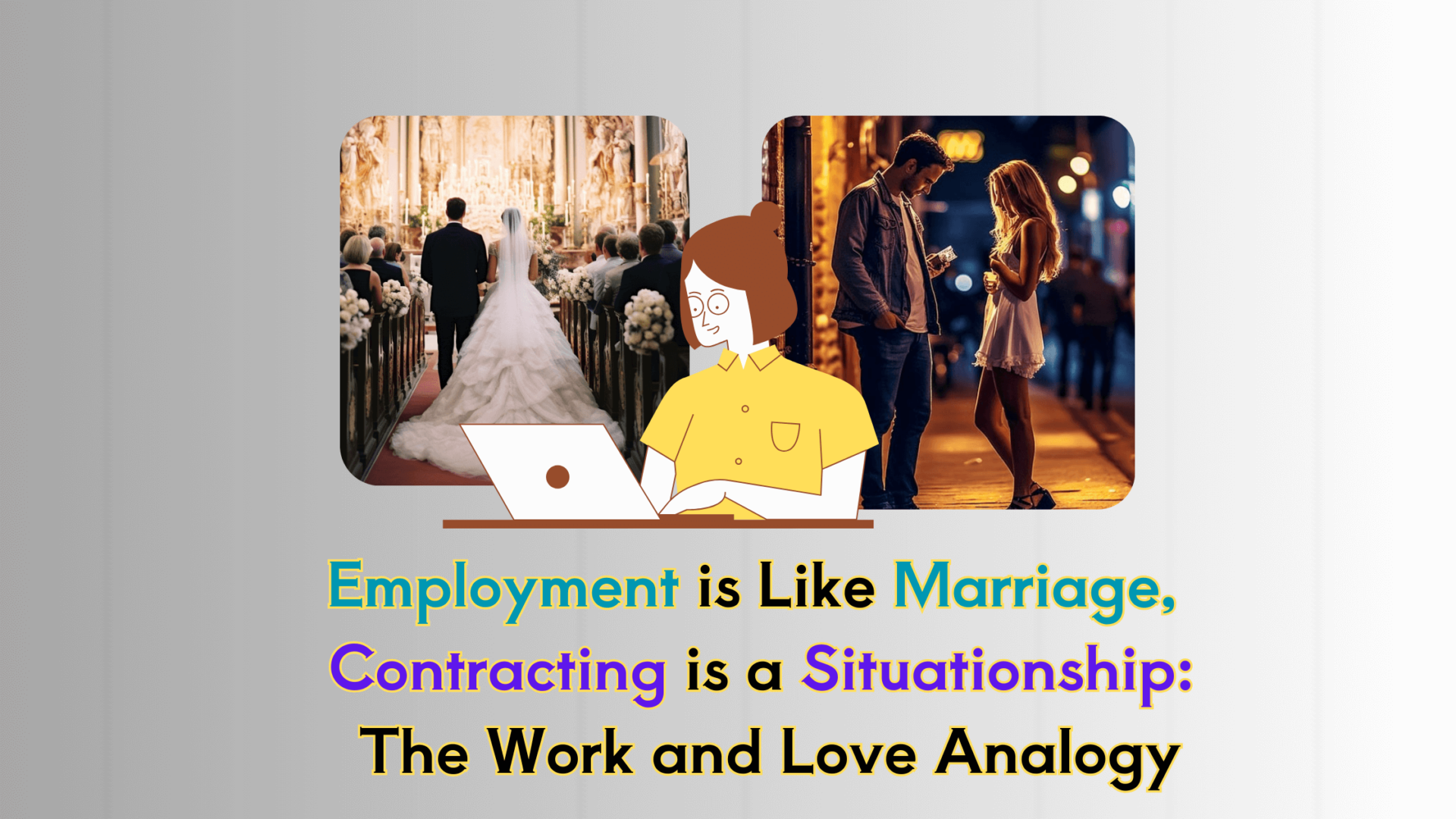I’ve worked as a permanent employee, contract employee, and independent contractor/consultant across Japan, the US, and the EU. It is not only legal distinctions, but both companies and individuals view full-time employees as more superior to contractors or temp staff. Interestingly, the dynamic between employment and contracting mirrors the differences between a long-term relationship or marriage and a situationship or casual dating.
Content
- 1 Commitment vs. Casual: The Work Relationship Spectrum
- 2 How Employers Value Long-Term Commitment
- 3 Contracting seen as Quick Fixes Without Commitment
- 4 Breaking Up is Hard to Do: Job Changes vs. Contract Work
- 5 Why Full-Time Employees Are Seen as More Valuable
- 6 Conclusion: Respect for Every Kind of Relationship—Work or Love
Commitment vs. Casual: The Work Relationship Spectrum
In a full-time job, like in marriage, both parties invest in each other for the long term. On the flip side, contract work is more like a casual relationship—manage multiple dating partners, get intimate fast, unattached, and free of long-term commitments.
This amusing analogy highlights how career choices and relationship dynamics reflect similar values and perceptions, shedding light on why both career paths and romantic relationships are viewed differently.
The Stability of Marriage vs. The Flexibility of Situationships
When it comes to full-time employment, long-term commitment is a prized quality. Employers, like romantic partners seeking stability, value employees who stick around for years. A resume filled with long-term roles evokes the same respect as a stable marriage. In both cases, commitment is key to growth and longevity.
On the other hand, independent contractors embody flexibility. They work for specific projects and move on or can have multiple projects simultaneously, much like a situationship—short-term, fast-moving, dynamic, but no-strings-attached. Once the contract is up, both parties part ways without drama.
How Employers Value Long-Term Commitment
Why Employers Love Long Tenure: The Marriage Analogy
Employers often reward employees who stay for the long haul. Like a successful marriage, loyalty and longevity are viewed as strengths. Long-term employees are trusted, given more responsibility, and invested in by the company. Promotions, bonuses, and career development opportunities come with staying power—just as marriage brings shared financial security and deeper emotional ties.
Contracting seen as Quick Fixes Without Commitment
The Perks of Being a Contractor
Contractors, however, enjoy a different dynamic. They bring specific expertise to the table and are hired for short-term needs. The allure is in the project’s excitement and the ability to move on once it’s done without being questioned loyalty. Like casual dating or a friends-with-benefits arrangement, it’s all about the now. The contractor brings value, but both sides know the relationship is temporary and won’t go much deeper.
Why Society Undervalues Contractors
Just as society sometimes undervalues casual relationships, contractors are often seen as “outsiders” compared to full-time employees. They may not receive the same level of respect, despite their important contributions. This perception reflects the broader view that long-term employment, like a long-term relationship, is more “serious” and “worthwhile.”
Breaking Up is Hard to Do: Job Changes vs. Contract Work
Full-Time Employees Are Harder to Let Go
Letting go of a permanent employee is like ending a marriage—it’s complicated. Especially in countries like Japan, where full-time employment is a big commitment, the process of parting ways can involve legalities, formalities, and emotional ties. An employee who’s been with a company for years has built relationships, trust, and knowledge that are not easily replaced.
Contractors Have Set Break-Up Terms
With contractors, things are simpler. The contract sets clear boundaries, including an end date. It’s understood that once the project ends, the relationship concludes. There are no dramatic break-ups, and both parties can move on easily. If things don’t work out, the contract can be terminated early without significant complications.
Why Full-Time Employees Are Seen as More Valuable
The Prestige of Employment vs. The Independence of Contracting
Full-time employment is often viewed as more prestigious, just as long-term relationships are often seen as more “serious” than casual dating. Permanent employees are seen as reliable and committed, while contractors are often viewed as temporary or transactional. Yet, much like casual relationships, contracting offers freedom, flexibility, and a wide range of experiences that permanent roles may not provide.
Conclusion: Respect for Every Kind of Relationship—Work or Love
Whether you’re navigating the world of full-time employment or enjoying the flexibility of contracting, the key takeaway is respect. Just like in romantic relationships, every professional arrangement—whether permanent or temporary—requires an appreciation for the other person’s time, skills, and value. After all, whether you’re committing for the long haul or enjoying the moment, we’re all consuming someone else’s lifetime. Let’s appreciate that, regardless of the relationship type.

